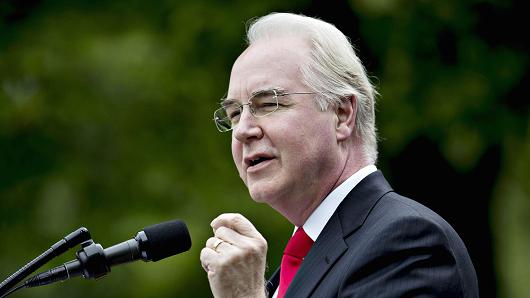
A reporter in West Virginia was arrested at the state capitol after repeatedly trying to ask President Donald Trump’s health secretary Tom Price questions about a Republican bill to replace Obamacare.
The arrest of veteran journalist Dan Heyman on Tuesday in a hallway in the Charleston capitol building was strongly criticized by his lawyer and the American Civil Liberties Union.
And it came on the same day that two Republican congressmen blasted Price’s Health and Human Services Department for a “potentially illegal and unconstitutional” memo issued May 3 restricting his subordinates from communicating independently with Congress without first informing HHS.
The department said the memo “reflects consistent agency policy which has been in place for decades.” HHS also said it does not prohibit direct communications with Congress.
Heyman’s arrest came after he tried to question Price, who was in Charleston with Trump advisor Kellyanne Conway, about the Republican Obamacare replacement bill, which the Trump administration has championed.
Specifically, Heyman said he was asking Price whether suffering from domestic violence would be classified as a so-called pre-existing condition under that bill.
The question relates to a provision in the bill that would potentially allow insurers in some states to charge people with pre-existing condition higher premiums than they would charge healthier people.
At a news conference after his arrest, Heyman said Price “didn’t say anything.”
“So I persisted,” said Heyman, a journalist for Public News Service who had been wearing his press pass during the incident. “At some point, I think they decided I was too persistent trying to do my job.”
Police mugshot of reporter Dan Heyman of Public News Service
An officer from the West Virginia capitol police then detained Heyman, and handcuffed him.
“I was arrested. The police did not ask me to back up. They didn’t give me the opportunity to walk away,” Heyman said Wednesday.
Heyman was charged with a misdemeanor: willful disruption of state government processes. Police said Price and Conway were being protected at the time by Secret Service agents.
A criminal complaint said Heyman was arrested after “aggressively breaching the Secret Service agents to the point where the agents were forced to remove him a couple of times from the area walking up the hallway in the main building of the Capitol,” according to NBC affiliate WSAZ-TV in Charleston.
The complaint also said Heyman caused a disturbance by “yelling questions at Ms. Conway and Secretary Price.” If convicted, Heyman faces a maximum sentence of six months in jail, and a $100 fine, his lawyer said.
“He wasn’t doing anything different than what happens every day around the country, which is a reporter trying to get a question answered,” said Heyman’s attorney, Tim DiPiero on Wednesday. DiPiero also said he failed to see how Price walking through a hallway in the state house was a government process that Heyman interfered with.
Alleigh Marre, HHS’ spokeswoman, declined to comment on the arrest, referring CNBC to law enforcement officials.
She said Price was in Charleston “as part of a listening tour to learn from those on the front lines battling the opioid epidemic,” which included hearing from “state and local policymakers, recovery advocates, first responders, treatment centers, faith-based organizations, good neighbors, and many more.”
Jamie Lynn Crofts, legal director at the ACLU of West Virginia, called on authorities to drop the charges. She also said that the arrest of Heyman is part of a pattern that has occurred since Trump became president.
“They have shown us every day since Donald Trump took office they don’t care about the First Amendment or the free press. Today was just another example of that. It’s horrifying,” Crofts said.
DiPiero, the lawyer, on Tuesday said that the reaction by police “just seems way over the top,” and called it a “really bizarre” arrest.
“I’ve never had a client get arrested for talking too loud or anything similar to that,” DiPiero said at the news conference after Heyman was released on $5,000 bail.
Heyman said he has covered health-care issues for years.
“I think it’s a terrible example” by police, Heyman said. “I think it’s dreadful. I mean, well, this is my job. This is what I’m supposed do. I am supposed to go out and find out if somebody is going to be affected by this health-care law.”
Benjamin Wakana, who until January had been spokesman for Price’s predecessor as HHS secretary, Sylvia Burwell, told CNBC on Wednesday, “If I supported a bill that destroyed protections for people with pre-existing condition, I probably wouldn’t want to answer questions either.”
“But that doesn’t mean you can arrest the person asking questions,” Wakana added.
In Washington on Tuesday, two leading Republicans, Sen. Chuck Grassley of Iowa and Rep. Jason Chaffetz of Utah, issued a scathing press release criticizing Price for a potentially illegal directive to staff, saying it could prevent whistleblowers from notifying Congress about problems at HHS.
The May 3 memo from Price’s chief of staff had told the heads of various HHS divisions “any communications with Members of Congress and staff should not occur without prior consultation with the Office of the Assistant Secretary for Legislation (ASL).”
“This includes requests for calls, meetings, briefings, technical assistance, policy development, hearings, oversight, detailees, etc.,” the memo said. The ASL is responsible for ensuring Secretary Price’s involvement on appropriate matters.
Grassley and Chaffetz, in a letter to Price, wrote, “The attached memorandum contains no exception whatsoever for lawful, protected communications with Congress.”
“In its current form, employees are likely to interpret it as a prohibition, and will not necessarily understand their rights,” wrote Grassley and Chaffetz, who are each chairmen of powerful congressional committees overseeing the judiciary and government affairs, respectively.
“These provisions are significant because they ensure that attention can be brought to problems in the Executive Branch that need to be fixed,” the duo wrote. “Protecting whistleblowers who courageously speak out is not a partisan issue — it is critical to the functioning of our government.”
“Absent such a clear communication from you, agency management may seek to intimidate whistleblowers from providing information to Congress. We will not allow that to happen and trust that nor will you. Protecting whistleblowers is crucial to effective government and the oversight process.”
HHS told CNBC that the department “is responding to the Chairmen’s inquiry,” and that “the purpose of the memorandum was to notify staff of the role of the Office of the Assistant Secretary of Legislation in coordinating policy responses with Congress.”
“Transitions between administrations can mean significant staff turnover, which often leads to confusion and a breakdown of communications,” HHS said in a statement. “This type of memorandum is nothing new. It reflects consistent agency policy, which has been in place for decades, as has been confirmed by the HHS Office of the General Counsel.”
“There is no prohibition in the memorandum on direct communications. In fact, the Chairmen’s letter explicitly states, ‘Although the language of the attached memorandum does not ultimately prohibit all direct communications from employees … If an HHS employee has concerns about waste, fraud or abuse at the agency, we want them to contact the appropriate officials so it can be stopped.’ ”
[Source”timesofindia”]





